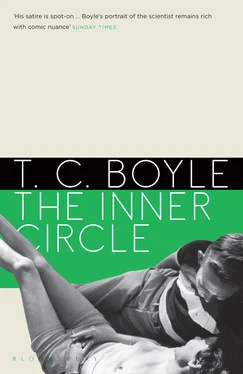She said nothing, but her eyes had begun to roam the room again.
“He did loan us the money,” I said. “You’ve got to give him credit for that.”
The next day was Saturday, and we worked all that day and Sunday too, putting up wallpaper, painting the ceiling in the living room an expansive high-flown white two shades removed from pure and generally scrubbing and rearranging things till we were both exhausted. Our first formal meal in the house had nothing of the celebratory quality of the meat loaf dinner Iris had prepared for me that first day in the apartment (I seem to remember a chicken of questionable age and tenderness, roasted with potatoes and carrots in a single pan, sans stuffing, gravy or greens, in the interest of keeping it simple) but it was a home-cooked meal nonetheless, cooked in our own home. Our son (“Or daughter,” as Iris kept reminding me) wouldn’t grow up in a rental, and he’d have his own yard in which to play ball and ride high on the swing set we planned to erect and maybe help his mother in the vegetable patch and just amble outside and pick an apple or peach or pear anytime he felt like it. Despite the smell of paste and paint fumes and the twin draughts that seemed to slice across the living room at six inches and six feet respectively, we were in heaven.
But then it was Monday, and I listened to Iris retch in the new toilet (or rather, the old toilet in the new house) and then I drove her to school and went into the office myself, and the routine started in again. Prok looked as if he’d been at work for hours when I got there at eight, his head bowed, skin drained of color under the distorting glare of the lamp. He glanced up and nodded a curt greeting as I came in, and it was as if he were wearing a mask — suddenly, in that moment, from that angle and in that light, he looked ancient, lines of fatigue cut under his eyes and radiating like parentheses from his pursed lips, his forehead scored, a series of vertical trenches delineating the jointure of his upper jaw and ear. There was gray in his hair, gray threaded through the boyish pompadour like blighted stalks in a field of wheat. And how old was he? I did the calculation in my head as I unwound the scarf from my throat and shrugged out of my coat: in June he would be fifty-three, in the prime of life. But the look of him, just then, gave me a stab of alarm. He was pushing himself too hard, I thought, pushing against a weakened heart and an immovable world, and all his power and magnetism and his unflagging energy couldn’t save him, couldn’t save anybody. I sat there a moment, sobered, and then I called across the room to him. “Prok, can I get you anything? Coffee maybe? A doughnut?”
He lifted his head and gave me a steady look, as if he were trying to place me, and gradually, the old familiar Prok began to settle back into his features. “No thanks, Milk, but I will need those charts on marital intercourse by educational level this morning, and we’re going to have to convene a special staff meeting too.” He paused, removed his glasses to pinch his eyes shut a moment. “Something’s come up.”
Corcoran and Rutledge strode in together then, sharing a private joke, and Mrs. Matthews began machine-gunning away at the typewriter. “Morning, Prok, John,” my colleagues chimed, Corcoran’s lips clamped round the pipe Prok wouldn’t let him light in the offices, Rutledge already sliding out of his coat. “How’s the house coming, John?” Corcoran wanted to know, and he bent over the desk to take my hand in his own and give my fingernails a mock inspection. “White for the ceilings, I guess, huh? Or is that the picket fence?”
In the confusion, I didn’t get a chance to ask Prok what the problem was — he was already gliding into the back room, conferring with Rutledge over something — and I forgot all about it till he rounded us up an hour later and gathered us in the inner office. We didn’t yet have a conference table — or room for one — and so we just pulled up chairs and settled in. Prok took a seat too, but he didn’t stay seated for long. He had a newspaper in hand, and he fanned it twice and then held it up for us to see: it was a small-town paper, the Star Gazette or Journal Standard or some such. “Remember this place?” he asked, and he was on his feet now, giving us a withering look.
We did remember it, if only vaguely. It was one of the comatose Midwestern towns we’d invaded sometime in the past six months, and it might have had a factory or foundry, a grain elevator, a small Lutheran college maybe, and Prok had addressed the League of Women Voters or the Lions Club or the Intercollegiate Anthropological Society’s Annual Convocation. It hardly mattered to us: we’d got our data and moved on.
“Isn’t that that place in Minnesota?” Corcoran was straddling his chair backward, the dead pipe in his mouth. “The one where we went on that wild-goose chase after the farmer with the giant penis? Or the ostensible giant penis?”
I had a glimmer of recognition. Prok had heard of a man in northern Minnesota whose penis reportedly measured an extraordinary twelve and a quarter inches flaccid — the local M.D. had written him an account of it — and we’d arranged a lecture trip in the vicinity in order to record the measurements. And if it sounds faintly ridiculous to go off in search of some random individual’s rumored appendage, please remember that this is precisely what a taxonomist does, recording the entire range of variety in a given species, from the smallest features to the largest. And further, if you’d expect such an individual to have a name like “Long John” or some such and be famed throughout his community, then you’d be disappointed: these unusual specimens, whether they exhibited extremes at the top or bottom of the scale, were unassuming and all but unknown. As I recall, in fact, we never were able to verify any measurement greater than nine inches, and this particular individual — the farmer — always seemed to be out in some distant field when we came round to investigate.
“No,” Prok said, his mouth tightening, “not actually. This town”—a finger stabbing at the paper’s masthead—“is in Ohio, in point of fact. But that’s not the issue, whether you remember the venue or not. What matters — what’s alarming, actually — is this article here in the lower left-hand corner of the front page.” He handed the paper first to Rutledge, who scanned the article, then passed it on to Corcoran, who finally gave it to me. The piece seemed innocuous enough — of the who, where, when variety of Journalism 101, describing Prok’s lecture to “a packed house eager to hear the findings of the noted sex researcher” at St. Agnes College — but Prok was incensed by it.
“I’ve spoken with the president of St. Agnes, with the editor of the newspaper and the journalist involved, and I’ve let them know in no uncertain terms that this article stands in breach of our verbal agreement that our figures were not to be published, that no specifics whatsoever were to be revealed.” His voice was metallic, laminated with a thin layer of outrage, and he was using the precise diction that became ever more honed and formal when he felt himself pushed into a corner. “And that further, I am considering legal action in that such leakages of our material can be expected to adversely affect the reception of our inaugural volume early next year. What I mean is, if our findings are broadcast now, even by some, some—” He paused, searching for the word.
“Podunk,” Corcoran offered.
“—inconsequential rag in a town far off the beaten path, then we are in real trouble, and if you think this is a laughing matter, Corcoran — or you, Milk — then you are as much enemies of the project as this so-called journalist. ”
Читать дальше












